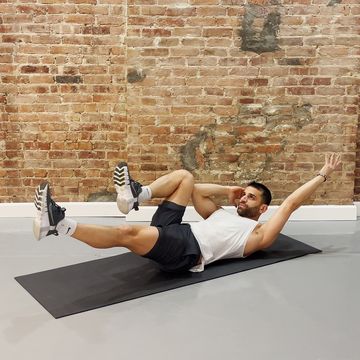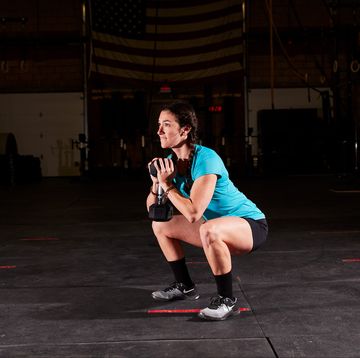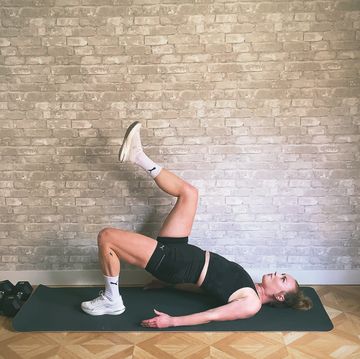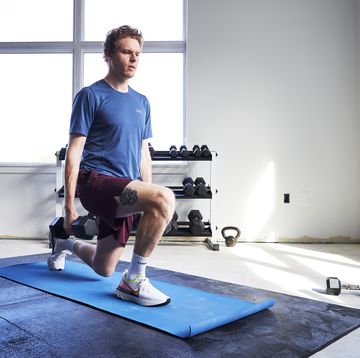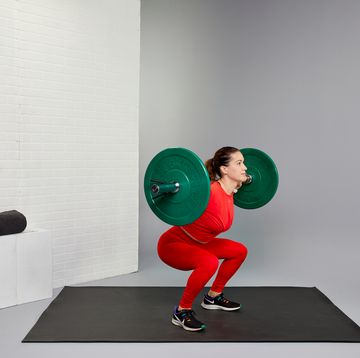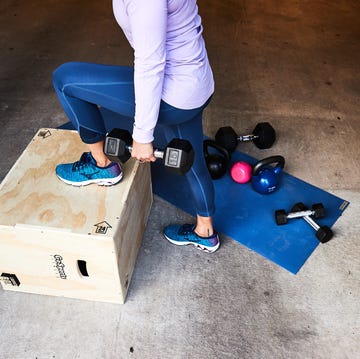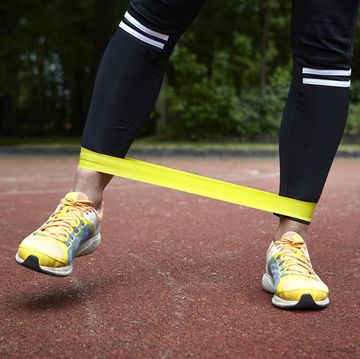If you want to be a successful runner, you need to be a strong runner. And that means you need some muscle on your bones. It’s common for runners to shy away from building muscle mass—and strength training, for that matter, which helps you build that mass—but doing so has many benefits.
For example, research suggests that strength training and building muscle can improve your performance and help prevent injury. Building muscle can also help you live longer, according to research. And one study also finds a link between runners with more lean muscle mass and better bone mineral density and content.
Here’s everything you need to know about how runners can build muscle, how the sport of running aids in that process, and why it’s helpful—and necessary—for runners to have lean muscle mass.
How the Body Builds Muscle
Ready for a science lesson? “Simply put, muscle hypertrophy, the building of muscle, is the response to the muscle being overloaded through an activity such as strength training,” says Tom Holland, C.S.C.S, exercise physiologist, certified sports nutritionist, and author of The Marathon Method and help you build muscle. “The muscle fibers are ‘damaged’ by the stress of resistance training, creating micro tears in the muscle fibers, and the body’s natural repair process includes increasing the size of the muscle fibers, and thus the size of the muscle itself.”
But the body can’t just rebuild alone—muscle is made out of protein, explains Melanie Sulaver, M.S., R.D., C.D.N., sports dietitian based in New York City. We need an adequate Races & Places Nell Rojass Strength Workout for Better Running.
“Muscle is developed by a positive protein balance, which means that the body is synthesizing more muscle proteins than it is degrading,” says Brad Schoenfeld, Ph.D., C.S.C.S.-D, professor of exercise science and director of the graduate program in human performance and fitness at Lehman College when muscles need the macronutrient to repair themselves protein then have that bite rebuild after a workout, A Part of Hearst Digital Media.
Why Muscle Is Important for Runners
It may seem counterintuitive as a runner to have a lot of muscle on your body—the more muscle you have, the more you must carry around when running. But it’s more important than you might think, and runners need muscle for a variety of reasons.
According to a review in the journal Sports Medicine, strength training—which you need to do to actually build muscle—can help improve sprint performance and running economy.
“We earn a commission for products purchased through some links in this article go faster, and endurance runners need it to go farther,” Holland says. “Muscles can also store energy, they can improve running economy, they stabilize and protect the joints, and they help prevent injury, allowing you to train harder and run longer.”
Animal Protein vs. Plant Protein Explained protect the joints can Sales & Deals more efficiently than others.
How Running Aids in Muscle Building
“It is a common myth that running ‘eats’ muscle tissue,” explains Holland. But that isn’t the case. Running, in fact, can Sales & Deals.
“fuel your runs cardiovascular exercise, involving forces of two-and-a-half to three times your bodyweight with each stride,” says Holland. “This will help build the muscles of the lower body including the glutes, quadriceps, hamstrings, calves, and more.”
Published: Jun 17, 2022 9:50 AM EST.
“The Best QL Stretches and Exercises progressive overload of muscle tissue, and this is not readily achieved by aerobic-type exercise,” explains Schoenfeld. “There can be some mild increases in muscle size in the early stages of a running program for those who were previously sedentary, but these gains will rapidly plateau within a few months.” If runners are really looking to gain or build muscle, the best way to do it is outside of their sport.
How Runners Can Build Muscle Outside of the Sport
According to research done by Schoenfeld and other colleagues published in the journal Sports Medicine, aerobic training doesn’t promote the same skeletal muscle hypertrophy as resistance or strength training. “Resistance training is the primary interventional strategy for increasing muscle size,” explains Schoenfeld.
To maximize the muscle-building benefits of strength training, another study from the International Journal of Environmental Research and Public Health breaks down the specifics. It found that hypertrophy-oriented resistance training was most effective when performed at a moderate intensity of about 60% to 80% of your one-rep max or how much weight you can lift for just one rep. (That means the weight should feel challenging and fatigue the muscles.) As for volume, aim for 3 to 6 sets, including 6 to 12 repetitions per set, and short rest periods of about 60 seconds between those sets.
All About Workout Splits for Strength Training Races & Places, know that it takes a consistent practice and a decent amount of time to see muscle gain.
Why Your Diet Matters for Building Muscle
While resistance training is important for building muscle, as we hinted at earlier, you can’t ignore your diet, particularly as someone who’s constantly burning calories. When you’re running upwards of 50 miles a week, you need to make sure you’re also consuming enough to support what your body is burning.
“Muscle is built primarily via resistance training, with a secondary contribution of diet, particularly consuming sufficient dietary protein,” says Schoenfeld. Protein takes longer to break down as a fuel source, which means it won’t necessarily fuel your runs, The Best QL Stretches and Exercises.
“The essential amino acids are used to build muscle proteins, and consumption of these essential amino acids through the diet is obligatory for maximizing muscle gains,” says Schoenfeld. “The most important factor is consuming adequate daily protein. Recent research indicates that the estimated average requirement for protein in endurance athletes is approximately 2.1 grams per kilogram of body weight, per day, which is substantially higher than the recommended daily allowance.” For a 150-pound person, that’s about 143 grams of protein per day.
While timing of eating might not be as important, it’s also a good idea to make sure you’re spreading protein intake out throughout the day, explains Leslie Bonci, M.P.H., R.D., C.S.S.D., sports dietitian for the Kansas City Chiefs, Carnegie Mellon University athletics and founder of Active Eating Advice. “The more evenly you eat it—rather than minimal amounts early in the day and large amounts at night—the better.”
The body’s preferred energy source when it comes to running, however, is carbohydrates, and then fat. “Carbohydrates are important because in the absence of adequate carbs, the body needs to break down protein to provide energy to the exercising muscles,” explains Bonci. “So if you’re trying to increase muscle mass, minimizing carb intake is not ideal.”
The Importance of Recovery in Muscle Building
Another big component in building muscle is the time the body takes to repair the micro-tears made in the tissue. And that happens during another important part of your training plan: your recovery!
“Recovery is very important; if a person is under recovered then their performance will suffer and over time, they may become overtrained, which has a number of negative consequences,” says Schoenfeld, including risk for injury then have that bite.
That’s why it’s important to incorporate recovery runs in your training plan, and to make sure you’re getting adequate sleep. “Sleep is means for your body to recuperate, so proper sleep is important to maximizing recovery,” explains Schoenfeld. Adults aged 18 to 60 should aim for seven plus hours of zzzs per night.
Benefits of Lifting Light Weights faster recovery, too. “The evidence that pre-sleep protein provides benefits is limited to a higher- versus lower-protein intake,” says Schoenfeld. “There is not sufficient evidence to indicate that consuming protein before sleep is superior when daily protein intake is equated.” But if a protein snack before bed helps you hit your daily quota for the muscle-building macro, then have that bite.
The Bottom Line on How to Build Muscle
Yes, there is a lot to consider when building muscle as a runner. It doesn’t happen overnight and takes time, but consistency is key.
“If you consume a balanced diet with adequate daily protein and engage in a consistent Benefits of Lifting Light Weights, you will achieve your genetically best-body—with muscle,” says Holland.

Amy Schlinger is a health and fitness writer and editor based in New York City whose work has appeared in Men’s Health, Women’s Health, The New York Post, Self, Shape, Cosmopolitan, Glamour, and more; The National Academy for Sports Medicine Certified Personal Trainer (NASM-CPT) is extremely passionate about healthy living and can often be found strength training at the gym when she isn’t interviewing trainers, doctors, medical professionals, nutritionists, or pro athletes for stories.


